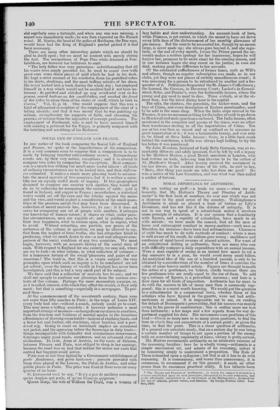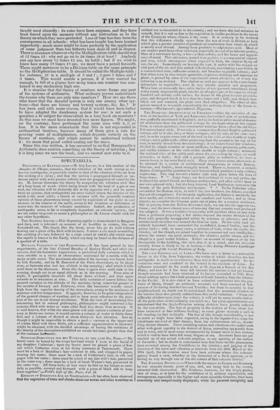MORAL IMPORTANCE OF ARITHMETIC.
WE are writing no puff— a trade we scorn — when we say honestly, that Mr. Hutton's Theory and Practice of Arith- metic* is the first book of numbers we ever saw which was not a disgrace to the good sense of the country. Walkinghame's Arithmetic is about as absurd a book of tuition as Lilly's Grammar, and has not like it the defence of antiquity. It is not in our way to speak of a school-book unless it involves some principle of education. It is our opinion that a familiarity with figures, and a rapidity of calculation, have much to do with morals : we have made the remark, that all the men of loose and extravagant conduct in money-matters—such men as Sheridan, for instance—have been bad arithmeticians. Clearness of sight has much to do with rectitude of conduct : where a man is well aware of the result, he seldom goes wrong : muddiness and confusion of mind breed swarms of absurd actions. For want of an enlightened drilling in arithmetic, there are many who can with difficulty compare a daily expenditure with an annual income. Were a man capable of seeing in an instant how much 3s. 6d. a day amounts to in a year, he would avoid many small follies. An analytical idea of the use of a hundred pounds, is only to be obtained by a consideration of the number of times it contains the value of some known useful article. Figures are thought beneath the notice of a gentleman, we believe, chiefly because there are few gentlemen who are really equal to the use of them. To add up a column of figures, is a proverbial nuisance ; and here is a door open for all kinds of imposition. Arithmetic has far more to do with the success in life of many men than is commonly sup- posed : this is a secret worth knowing. We would put the question to a schoolmaster in a commercial town, whether those of his scholars who have figured in the gazette, were not bad arith- meticians at school. It is impossible not to see, on reading the details of Buonaparte's generalship, that his success was mainly owing to his power of combination : this is neither more nor less than arithmetic : a few maps and a few reports from the war de- partment supplied his data. His movements were problems of this kind :—Given so many men in so many given positions, to find the time in which they can concentrate at a certain point ; or given the time, to find the point. This is a sheer question of arithmetic. If a general can calculate nicely, that on a certain day he can bring a certain number of troops to act upon a portion of the enemy with an overwhelming superiority of force, victory is pretty certain. Mr. Hutton recommends arithmetic as an admirable exercise of the reasoning faculties : here he is wholly wrong—arithmetic is a simple mechanical art, and admits of no reasoning, unless it be reasoning simply to understand a proposition. The Rule of Three is founded upon a syllogism ; but that is all it has to do with reasoning. It is unnecessary, and worse than unnecessary, it is erroneous, to recommend it on this ground ; it needs no other praise than its enormous practical utility. It has hitherto been * The Theory and Practice of Arithmetic ; in winch the subject is treated as a science established upon its own principles, illustrated by its own evidences, and made effectually subservient to an attainment of the Mathematics; designed for the use of schools, private tutors, and families. By George Hutton, 12mo, Lon- don, 162d. taught most absurdly : its rules have been enigmas, and they have been forced upon the memory without any instruction as to the theory on which they were grounded. Loss of time has thus been the consequence in all schools : what has been taught has been learned imperfectly: much more might be done perfectly by the application of some judgment than has hitherto been done ill and in disgust. There is no reason whatever why the Multiplication-table should stop at 12 times 12: why not go on to 20 times 20 at least ? Anybody can say how many 12 times 12 are, by habit ; but if we wish to know how many 19 times 19 are, we must have a pencil forsooth. There ought moreover to be a Division-table on the same principle as the Multiplication-table. It should be called the Multiple-table : for instance, .21 is a multiple of 3 and 7; 3 goes 7 times and 7 3 times. This would enable a person, if it were carried far enough, to tell at a glance how many times one number was con- tained in any moderately high one. It is singular that the theory of numbers never forms any part of the systems of arithmetic. What ordinary person understands the reason why there are only nine numbers ? How few are there who know that the decadal system is only one among other sys- tems—that there are binary and ternary systems, &c. &c. ? It has ;been said with some reason, that it would have been better to have adopted the duadenary system for use : is not such a question a fit subject for observation in a long book on numbers ? in this case we must have invented two more figures. We might, on the contrary, have performed 'the same uses with 8, 7, or less. It is the more remarkable that this is not expounded in arithmetical treatises, because many of them give a rule for proving sums of multiplication, which depends entirely on the theory of numbers, and which cannot be understood without it : we mean that proof called casting out the nines.
Since this was written, it has occurred to us that Bonnyeastle's Arithmetic does contain something on the theory of notation ; but it is long since we saw the book, and we cannot now refer to it.



















 Previous page
Previous page